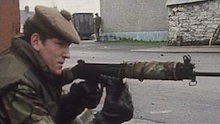
Some families of people shot dead by the British Army have found clear evidence that British soldiers were given a green light to shoot and kill civilians in the north of Ireland.
Relatives for Justice said it has seen secret documents which proves the British Army was given an amnesty for murder.
It said senior British government and military figures agreed the move during a meeting on 10 July 1972.
The meeting was attended by British army top brass including the general officer commanding of the army at the time, Harry, Tuzo as well as a number of senior British civil servants in Ireland.
The minutes contain the statement: “The army should not be inhibited in its campaign by the threat of court proceedings and should therefore be suitably indemnified.”
The family of a teenager shot dead in the garden of his west Belfast home 40 years ago have now asked for the inquest into his death to be reopened.
Gerald Gibson was shot in the head by a British soldier at the front of his home in Carrigart Avenue in the Lenadoon estate on July 11 1972 - the day after the meeting.
He was one of 79 people killed by the British Army that year, the vast majority of them civilians.
No soldiers faced court proceedings for any of the killings. The account of the secret meeting in Stormont Castle explains why.
The document includes an announcement declaring “the government’s intention to carry on the war with the IRA with the utmost vigour”.
Gerard Gibson’s family said they believe it explains why no-one has ever been prosecuted in connection with his killing, and those of others shot by soldiers.
“We were shocked when we saw this document,” said his sister Margaret Gibson.
“Basically what we take from this document was that the British Army was told go and do what they wanted, without fear of prosecution and it seems my brother was an innocent party, and they just took his life.”
The group that discovered the document said it has huge political and legal implications.
“This is the first document that has ever been revealed that talks about indemnifying soldiers from court proceedings,” said Relatives for Justice director Mark Thompson.
“It is an amnesty, it is impunity and that’s what we have always believed. Now we have the concrete evidence that shows that the impunity existed,” he said.
Mr Thompson said such an amnesty would be “illegal under domestic and international law and the document proves it happened”.
The family of Gerard Gibson and others killed by soldiers plan to use the document in a legal action against the Ministry of Defence.
“We would like to see a prosecution,” said Ms Gibson. “We would like to see them held to account.”
Lawyers for the Gibson family have now asked for a previous report on the killing by the police Historical Enquiries Team (HET) to be reviewed and to take into account new material.
Lawyer Kevin Winters went further, and said that the document would require the HET to review all of its reports into British army killings of the 1970s.
“Anything short of that will be a breach of its investigative obligations,” Mr Winters said.
![[Irish Republican News]](https://republican-news.org/graphics/title_gifs/rn.gif)
![[Irish Republican News]](https://republican-news.org/graphics/title_gifs/harp.gif)

